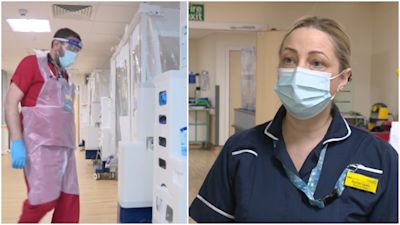Covid: Hospital bosses in Derbyshire consider cancelling non-urgent treatments over staff shortages

ITV News Central Reporter Lewis Warner hears from staff on the frontline on the impact the Covid pandemic is having
Hospital bosses in Derbyshire have said non-urgent hospital treatments may have to be cancelled as Covid cases continue to rise and staff members are unable to work.
The Derby and Burton NHS Foundation Trust has said around 1,000 staff members either have coronavirus or are self-isolating, a figure that has more than doubled in two weeks.
Advanced Clinical Practitioner, Andy Adams, told ITV News Central: "Staff are members of the public too and we've been exposed to the virus and impacted by the virus like everybody has."
Mr Adams adds: "Unfortunately that does impact on our staffing and it has impacted on our staffing."
He said: "It does affect morale after a while, it's pretty relentless and time consuming and all consuming really.
"Staff are members of the public too and we've been exposed to the virus and impacted by the virus like everybody has", health worker says
"It can be very difficult to know where you're working on any given day, be prepared to change where you're working and the way you're working."
Mr Adams adds: "We've all been very adaptable over the past couple of years, we've had to be."
Nurse Rachel Lewis said: "We've got no beds upstairs and we can't move patients up, which means patients are left in the emergency department (ED) for longer, this impacts on the wait time for people who do need to be seen".
She adds: "They have to prioritise those who are the most critical patients, trauma patients, so those with a minor injury can be waiting in the ED for hours on end."
"We've got no beds upstairs", says nurse at hospital in Derby
While the number of people being admitted to hospital with coronavirus is much lower than in the first wave thanks to the vaccines - even the smaller number coming in now mixed with large number of staff off sick or isolating -
At Derby City Hospital, bosses say their concerns have been ignored.
They fear things could get worse before they get better and in order to concentrate on covid - some non-urgent treatment might be postponed.
Gavin Boyle, the trust's chief executive, said: "Over the next few weeks we may have to stand down some of that planned activity in order to release staff to support the critical frontline."
He added: "We talk about routine surgery but if it's you who's waiting it won't feel routine, it's not a decision we take lightly but our priority has to be emergency patients, people with life threatening conditions and those with time critical conditions such as cancer." Chris Hopson, the chief executive of NHS Providers, which represents trusts, said a critical incident was "an indication of very serious pressure" at a trust which may "not be able to provide" a range of priority services.